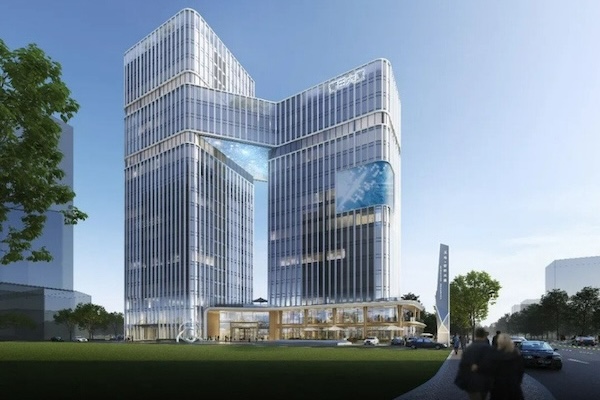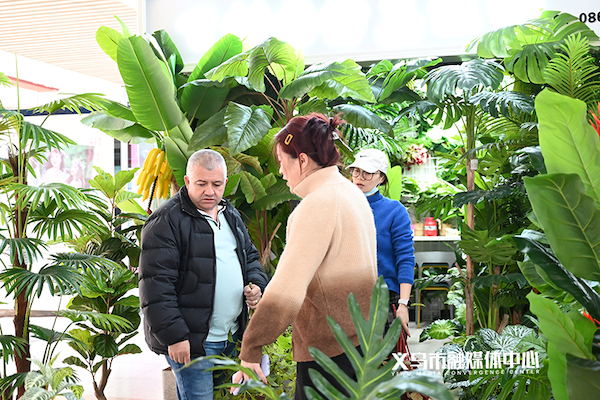Yiwu's transformation is remarkable

Workers assemble photovoltaic panels at a smart workshop in Yiwu, Zhejiang province, in June 2021. SHI BUFA/FOR CHINA DAILY
As I stepped into the bustling corridors of Yiwu International Trade Market, the vibrant atmosphere immediately caught my attention. The air was filled with a cacophony of languages, as merchants from around the world mingled with local shop owners, engaged in animated conversations, and negotiated deals.
Yiwu in Zhejiang province, renowned as the world's capital for small commodities, is undergoing a remarkable transformation. While the bustling trade in buttons, toys and apparel continues unabated, there is a palpable shift toward a new frontier — the new energy sector.
The opening of the country's first specialized market for showcasing and trading in new energy products in Yiwu International Trade Market last year signifies the city's embrace of this burgeoning sector.
Walking through the market, I witnessed the convergence of innovative technologies and sustainable solutions, as sellers now showcase tens of thousands of new energy products including photovoltaic modules and energy storage systems.
What is particularly striking is the scale of investment and growth in Yiwu's photovoltaic industry. With the establishment of numerous enterprises and the implementation of strategic plans, Yiwu is poised to become one of the key players in China's transition toward renewable energy. The ambitious targets set by local authorities reflect their commitment to fostering a thriving ecosystem for the development of new energy technologies.
The output of Yiwu's photovoltaic industry reached 87.23 billion yuan ($12.13 billion) in 2022, accounting for over 30 percent of the total output of the photovoltaic industry in Zhejiang province. According to Yiwu's plan, the total output of its photovoltaic industry is expected to reach 100 billion yuan by the end of 2025, with the formation of five leading enterprises with output value exceeding 10 billion yuan each and several enterprises with output value exceeding 1 billion yuan each.
Yiwu's embrace of photovoltaics symbolizes a broader narrative of transformation within China's manufacturing landscape. It underscores the country's determination to adapt to changing global dynamics, innovate and lead the way toward a more sustainable future.
China's exports have witnessed a marked shift to high-tech and green "new three" products. The export of electric vehicles, lithium batteries and photovoltaic products — collectively, they are referred to as the "new three" — increased by close to 30 percent year-on-year last year.
Louise Loo, lead economist at British think tank Oxford Economics, highlighted the strategic importance of the "new three" in driving high-quality growth, saying her team estimates that these new industries and their related sectors upstream will make up around 11 percent of China's GDP.
Looking ahead, Loo said these industries will become an alternative growth driver for China, especially once the pain from the property drag plays out over the next few years.
Tian Xuan, associate dean of Tsinghua University's PBC School of Finance, said China's economy is transitioning away from a high-speed phase to one characterized by high-quality development. "It entails a shift of growth drivers from old to new during the process of economic structural transformation."
He also highlighted the importance of "embracing the new without abandoning the old", saying "we should not abandon the old drivers all at once."
According to the latest Government Work Report, the country must adhere to the principles of pursuing progress while ensuring stability, promoting stability through progress, and establishing the new before discarding the old.
"The meaning of 'establishing the new before discarding the old' refers to the process of ensuring a smooth transition from old drivers of growth to new ones," Tian said. "We should not rashly pursue new drivers at the expense of causing oversupply or excess capacity in certain sectors."
He further noted that some traditional sectors still enjoy growth potential and room for upgrade and transformation, and called for more efforts to foster new growth drivers and cultivate new quality productive forces.

 Yiwu and Qingtian: Global supermarket alliance spurs economic growth
Yiwu and Qingtian: Global supermarket alliance spurs economic growth Artificial flowers: Yiwu's evergreen business
Artificial flowers: Yiwu's evergreen business Yiwu Intl Trade Market reopens after Spring Festival holiday
Yiwu Intl Trade Market reopens after Spring Festival holiday